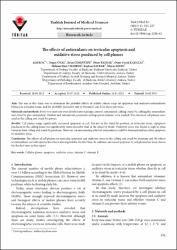| dc.contributor.author | Koç, Akif | |
| dc.contributor.author | Ünal, Doğan | |
| dc.contributor.author | Çimentepe, Ersin | |
| dc.contributor.author | Bayrak, Ömer | |
| dc.contributor.author | Karataş, Ömer Faruk | |
| dc.contributor.author | Yıldırım, Mehmet Erol | |
| dc.contributor.author | Bayrak, Reyhan | |
| dc.contributor.author | Aydın, Murat | |
| dc.date.accessioned | 2019-05-16T19:38:03Z | |
| dc.date.available | 2019-05-16T19:38:03Z | |
| dc.date.issued | 2013 | |
| dc.identifier.issn | 1300-0144 | |
| dc.identifier.uri | https://hdl.handle.net/20.500.12462/4533 | |
| dc.description | Koç, Akif (Balikesir Author) | en_US |
| dc.description.abstract | Aim: The aim of this study was to determine the probable effects of cellular phone usage on apoptosis and oxidative/antioxidative balance in testicular tissue, and the probable protective role of vitamin C and E on these processes. Materials and methods: Forty-two male rats were divided into 6 groups: control, antioxidant, calling, stand-by, calling plus antioxidant, and stand-by plus antioxidant. Oxidant and antioxidant parameters and apoptotic indexes were studied. Two identical cell phones were used in the calling and stand-by groups. Results: Cell phone usage significantly increased apoptosis in call, but not in the stand-by position, in testicular tissue. Apoptosis produced in the calling mode was significantly more excessive than in the stand-by mode. Oxidative stress was found as high to some extent in both calling and stand-by positions. However, no ameliorating effect of antioxidants could be demonstrated on either apoptosis or oxidative stress. Conclusion: The effects of cell phones on testicular apoptosis and oxidative stress in the calling and stand-by positions and the effects of antioxidants on both injuries have been investigated for the first time. In addition, increased apoptosis by cell phones has been shown for the first time in this report. | en_US |
| dc.description.abstract | Aim: The aim of this study was to determine the probable effects of cellular phone usage on apoptosis and oxidative/antioxidative balance in testicular tissue, and the probable protective role of vitamin C and E on these processes. Materials and methods: Forty-two male rats were divided into 6 groups: control, antioxidant, calling, stand-by, calling plus antioxidant, and stand-by plus antioxidant. Oxidant and antioxidant parameters and apoptotic indexes were studied. Two identical cell phones were used in the calling and stand-by groups. Results: Cell phone usage significantly increased apoptosis in call, but not in the stand-by position, in testicular tissue. Apoptosis produced in the calling mode was significantly more excessive than in the stand-by mode. Oxidative stress was found as high to some extent in both calling and stand-by positions. However, no ameliorating effect of antioxidants could be demonstrated on either apoptosis or oxidative stress. Conclusion: The effects of cell phones on testicular apoptosis and oxidative stress in the calling and stand-by positions and the effects of antioxidants on both injuries have been investigated for the first time. In addition, increased apoptosis by cell phones has been shown for the first time in this report. | en_US |
| dc.language.iso | eng | en_US |
| dc.rights | info:eu-repo/semantics/openAccess | en_US |
| dc.subject | Cerrahi | en_US |
| dc.subject | Cellular Phone | en_US |
| dc.subject | Apoptosis | en_US |
| dc.subject | Oxidative Stress | en_US |
| dc.subject | Vitamin C | en_US |
| dc.subject | Vitamin E | en_US |
| dc.title | The effects of antioxidants on testicular apoptosis and oxidative stress produced by cell phones | en_US |
| dc.type | article | en_US |
| dc.relation.journal | Turkish Journal of Medical Sciences | en_US |
| dc.contributor.department | Balıkesir Üniversitesi | en_US |
| dc.identifier.volume | 43 | en_US |
| dc.identifier.issue | 1 | en_US |
| dc.identifier.startpage | 131 | en_US |
| dc.identifier.endpage | 137 | en_US |
| dc.relation.publicationcategory | Makale - Ulusal Hakemli Dergi - Kurum Öğretim Elemanı | en_US |


















